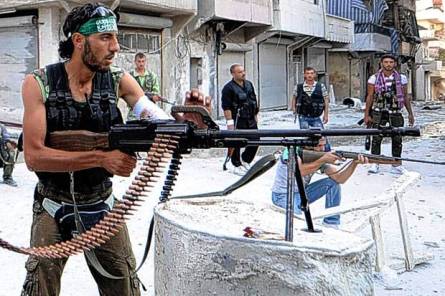The 21-August chemical attack was not the first of its kind carried out since the beginning of the Syrian civil war which has been on-going since March, 2011. From a little online research I have found six other alleged uses of chemical weapons since December, 2012. The U.N. has also commented on the attacks and accused the Syrian opposition of using chemical weapons.
The first alleged use of chemical weapons was reported on 23-December, 2012. Six or seven people were allegedly killed, depending on which report you read, in Homs by a “poisonous gas” used by the Assad regime. The coverage included the report of side effects such as nausea, relaxed muscles, blurred vision, and breathing difficulties.
According to Dr. Abu al Fida, who treated about 30 of the approximately 100 people who were affected by the mysterious gas:
"It's still an apparent misuse, but the chemical was found to not be Sarin or the banned "Agent 15," despite showing clinical similarities to both.”
As a consequence of the attack, on 15-January a U.S. Department communication from the U.S. consul general in Istanbul said there was compelling evidence that the Syrian military had used a chemical weapon known as Agent 15. Agent 15 is similar to 3-quinuclidinyl benzilate or BZ, a powerful hallucinogen. While Syria is well-known to have a massive supply of chemical weapons, international observers haven’t ordinarily included BZ on the list.
Over the years, there have been rumors of BZ being used on a battlefield — including one that Iraqi insurgents dosed themselves with the drug to pump up their aggressiveness. If the 15-January communication is accurate, it would be the first confirmed case of BZ employed as a weapon.
A day later, 16-January, Tommy Vietor, a spokesman for the U.S. National Security Council, said that the alleged incident of chemical weapons use was not consistent with information that the White House has about Syria’s chemical weapons program.
On 19-March two more alleged uses of chemical weapons were reported in Syria’s two main cities of Aleppo and Damascus The attacks reportedly killed between 25 and 31 people and injured dozens more. The Assad regime claimed that Syrian opposition forces were responsible for the attacks and on 20-March requested the United Nations conduct an investigation.
Four days later on 24-March Syrian opposition activists reported that Syrian forces had used chemical weapons from multiple rocket launchers at the town of Adra, northeast of Damascus, reporting to have killed 2 people and wounding 23. Doctors described that the weapons used were phosphorus bombs that harm the nervous system and induce imbalance and loss of consciousness.
On 13-April the Syrian Observatory for Human Rights (SOHR) said that the Syrian army dropped two gas bombs on rebel-controlled Aleppo, killing 2 people and wounding 12. Opponents of the Syrian government accused the army of using chemical weapons.
Another attack allegedly took place on 29-April. A helicopter dropped canisters containing chemical weapons on the town of Saraqeb; 8 people claimed symptoms such as nausea and breathing problems, and one of them later died.
The world looks to the United Nations to verify the use of chemical weapons and on 5-May, 2012 it did.
Carla Del Ponte member of the Independent International Commission of Inquiry on the Syrian Arab Republic
"According to the testimonies we have gathered, the rebels have used chemical weapons, making use of sarin gas," del Ponte, a former war crimes prosecutor and member of the U.N. Independent International Commission of Inquiry on Syria, said in an interview with Swiss radio on 5-May.
"We still have to deepen our investigation, verify and confirm (the findings) through new witness testimony, but according to what we have established so far, it is at the moment opponents of the regime who are using sarin gas," she added.
Ms. del Ponte, a former Swiss prosecutor and attorney general, told Swiss TV: “Our investigators have been in neighboring countries interviewing victims, doctors and field hospitals. According to their report of last week, which I have seen, there are strong, concrete suspicions but not yet incontrovertible proof of the use of sarin gas, from the way the victims were treated.”
In response Rebel Free Syrian Army spokesman Louay Almokdad denied that rebels had used chemical weapons.
“In any case, we don’t have the mechanism to launch these kinds of weapons, which would need missiles that can carry chemical warheads, and we in the FSA do not possess these kind of capabilities,” Mr. Almokdad told CNN.
“More importantly, we do not aspire to have (chemical weapons) because we view our battle with the regime as a battle for the establishment of a free democratic state. … We want to build a free democratic state that recognizes and abides by all international accords and agreements — and chemical and biological warfare is something forbidden legally and internationally.”
As mentioned in my last article “Syrian Civil War: 21-August Chemical Attack” evidence exists that the Syrian opposition do have chemical weapons. If the U.S is waiting for a U.N analysis, one exists from back in May suspecting the opposition of using chemical weapons.
Article originally posted on The Pianosa Chronicle
Sources:
The Telegraph Article “UN accuses Syrian rebels of chemical weapons use”
The Washington Times Article “Syrian rebels used Sarin nerve gas, not Assad’s regime: U.N. official”
Independent International Commission of Inquiry on the Syrian Arab Republic



